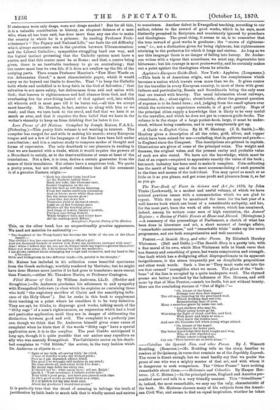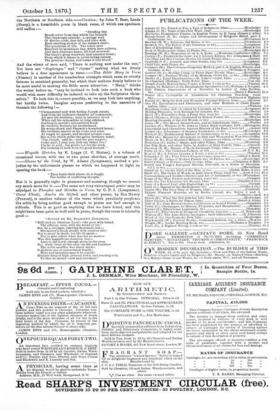Porrav.—A Seaside Story, and other Poems. By Elizabeth Hereby Whiteman.
(Bell and Daldy.)—The Seaside Story is a pretty tale, with. a fine moral of its own, which Miss Whiteman tells in blank verse that has fluency and something of grace, but wants compression and strength.. One fault which has a disfiguring effect disproportionate to its apparent insignificance, is the stress frequently put on dissyllable prepositions. and other weak words. Such a line as "They must wade out into the sea that seemed" exemplifies what we mean. The place of the " back- bone " of the line is occupied by a quite inadequate word. The rhymed poems are better ; touched by the influence of Mrs. Hemans, and stilt more by that of Miss Proctor,—much too facile, but not without beauty.. Here are the concluding stanzas of "Oat of Sight :"— " Oh, leisure of the heart, Strange lore thou dost impart!
The old man lingering by the graveyard wall, Whose working days are o'er, Remembering days of yore, Many a nameless grave by name can call.
"And children who may lie, While sunny hours go by, Watching the flight of cloud, and bee, and bird,
With heart and brain at rest,— They knew the hidden nest,
And saw the blossoms fall when young wings stirred.
"Oh, leisure of the heart!
Perchance the better part,
The bettor knowledge they have sought and won, Who sit with watchful eye
While others toiling nigh,
Cry out, 'Thou leavest me to serve alone: —Catalina the Spanish Nun, and other Poems. By J. Wimsett Bonlding. (Bemrose.)—Mr. Boulding tells us the story, familiar te readers of De Qaincey, in verse that reminds us of the Ingolcisby Legends. The verse is fluent enough, but we need hardly say that we prefer the. prose of one who was a mighty master of that art, and with whom it is dangerous to seek comparison. The "Other Poems" have nothing remarkable about them.—Britannia and Columbia. By Hasper Hat- teras. (J. C. Hotten.)—In the principal poem, England and America per- sonified meet and talk in a very friendly manner. This "friendliness" is, indeed, the most remarkable, we may say the only, characteristic of the book. Mr. Hatteras chooses many of his subjects from the Ameri- can Civil War, and seems to find an equal inspiration, whether he takes the Northern or Southern side.—Creation : by John T. Beer, Leeds (Sharp), is a formidable poem in blank verse, of which one specimen will suffice :—
"Dividing this Broad cavity from that which lies beneath The diaphragm extends ; a springy wall Of fibrous cords, that falls and rises with Each swelling motion of the inflated chest ; The pendulum of life. The lower cave Received its membrane bag. which here collects, And then disperses hence, all food received ; The heart's great reservoir, and constant fount ; From which it draws in never-failiag stream The precious chyme, and forms it into blood."
And the wisest of men said, "There is nothing new under the sun." Yet here are " diaphragm " and " chyme " making what we firmly believe is a first appearance in verse.—The Bible Story in Verse (Nimmo) is another of the numberless attempts which seem so utterly fatuous to mankind generally, but which their authors firmly believe to be most useful in making the Bible more attractive. "Many," thinks the writer before us, "may be inclined to look into such a book who would with more difficulty be induced to take up the Scriptures them- selves." To look into it,—once possibly, as we may look into anything, but hardly twice. Imagine anyone preferring to the narrative of Genesis the following !— "Ceerreastered now with feeling Joseph stands, And from the andience-chamber all commands, All save his brethren; none in presence stood While (all his sympathies so long subdued, Gushing in nature's unrestricted flood) He tenderly declares his brotherhood. He weeps aloud, and Pharaoh's household hears; His brethren marvel at his looks and tears. At length he speaks, and kindest accents come, But words which strike the guilty brethren dumb. I'm Joseph,' said he, and the past forgive ; Come near, I pray you, doth my father live ? I'm he ye sold; but grieve not for the deed, For seeming ill bath been for good decreed.— —Wayside Sketches, by E. Legge (..T. C. Hotten), is a volume of occasional verses, with one or two prose sketches, of average merit. —Glenna •of the Creek, by W. Adams (Longmans), excited a pre- judice by the unfortunate phrase on which we happened to light on opening the book Thou battle-field where oft is fought The battles of conflicting thought."
Bat it is generally right in grammar and scanning, though we cannot say mach more for it.—The same not very extravagant praise may be adjudged to Thoughts and Sketches in Verse, by C. P. I. (Longmans). ' Count Ulaski, Amelia the Gifted, and other poems, by Eta Mowry (Provost), is another volume of the verse which peculiarly perplexes the critic by being neither good enough to praise nor bad enough to ridicule. This is as good as anything that we have found, and this /night have been quite as well. said in prose, though the verse is tolerably good:—
"SONNET ON MR. PEABODY'S DONATIONS.
"Still feed us, Gracious Lord !—the poor with bread, The affluent, ever, with the bread of life !
See, by a stranger, starving thousands fed,— See misery's bleak abodes with comfort rife !
Not to atone in death, for life ill-spent- Not to give others what was his no more— Was this magnificent donation lent—
Lent to the Lord—though given to the poor.
No! while 'twas all his own—in life and health—
The noble sacrifice was freely matte ;
0 glorious use of consecrated wealth!
Here and hereafter may it be repaid !
Measure heaped high, pressed down, and running o'er, To thee be meted—now and evermore."































 Previous page
Previous page